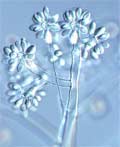Allergies
 Pollen Pollen
|
|
Allergies occur when airborne pollutants (allergens) such as pollen, animal dander, mold pores, dust etc. get inhaled into our sinus cavities (air spaces in the cranial bones). This causes a swelling of the ostium (opening of the sinus cavities), which causes the ostium to become blocked. When the ostium becomes blocked drainage is hindered, and this causes obstruction within the sinus cavities.
Sometimes the cause of allergies can be due to the immune system mistakenly trying to protect itself from harmless substances and in the process, causing an allergic reaction (swelling or inflammation in the sinus cavities).
Bacterial Infections
Bacterial infections are normally caused by bacteria, which may be followed by a viral infection. When you have a bacterial infection, it must be carefully treated. Bacterial infections usually infected your sinuses. Viral infection symptoms are almost identical to that of bacterial sinusitis, but bacterial sinusitis is more severe and lasts longer. If a bacterial infection is not treated, it can lead to a condition called bacteremia (the presents of bacteria in the blood).
 Fungus Fungus
|
|
Fungus Infection
Fungi are plant-like organisms that lack chlorophyll. They cannot produce their own food therefore absorb food from dead organic matter. Fungi, like bacteria possess the ability to break down complex organic substances of almost every type. A fungal infection presents itself as Chronic Sinusitis. Excessive use of antibiotics can also cause a fungal infection, which are becoming more prevalent and are often due to a weakened body's defense mechanism.
Viral infections
A viral infection can last between 7 to 14 days, is preceded by Acute Sinusitis and may cause a hundred different strains of viruses. A viral infection causes inflammation to the sinus lining, which causes nasal congestion, a runny nose and sometimes pressure.
 Nasal Polyps Nasal Polyps
|
|
Nasal Polyps
Nasal Polyps are growths that grow inside the nose and are often a response to inflammation of the sinus lining and usually reoccur even when they have been surgically removed. Nasal Polyps block nasal airways and prevent proper drainage of mucus in the sinus cavities. When drainage does not occur, mucus stagnates and becomes infected which then leads to Sinusitis.